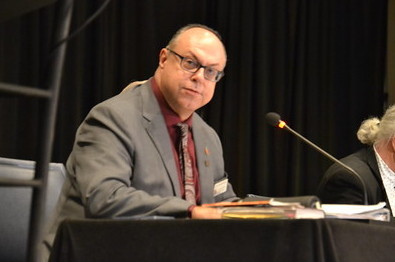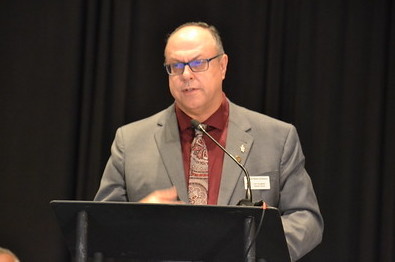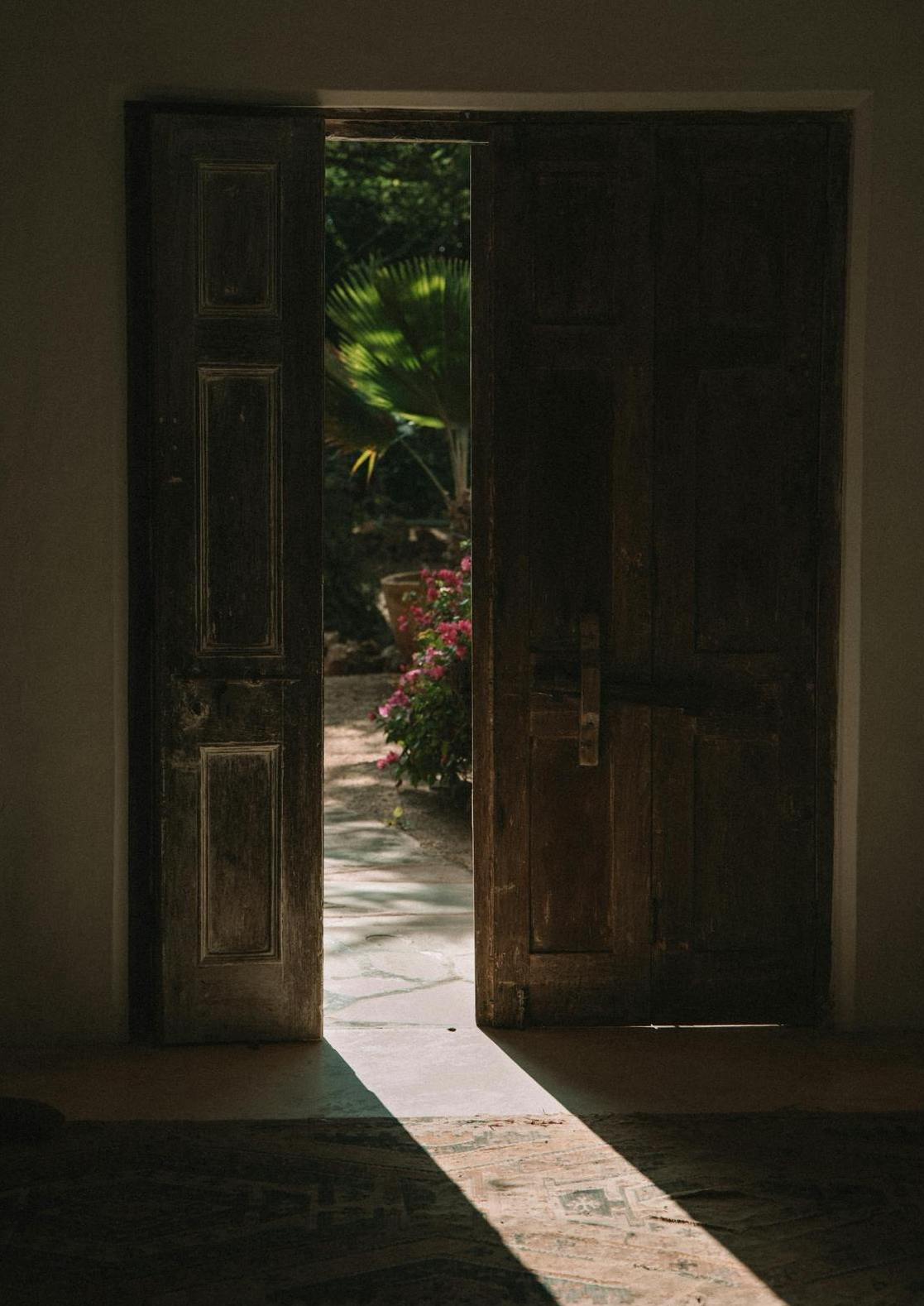HEAL Well Plans Earth Day Event and More
Northern Illinois Conference’s HEAL (Helping Everyone Access Life) Well ministry has planned an Earth Day event for all ages on April 26, 10:30 a.m., at Olivet UMC in Chicago.
Watch the video of this address
Let’s begin with gratitude. Thank you, siblings in Christ, for your faithfulness. In the past year I have met so many more faithful leaders in the Northern Illinois Conference and have enjoyed being in ministry with you. From the Shepherding Team to the Episcopacy Committee, from the Trustees to the Conference Council on Finance and Ministry, from Savannah to the east side of Chicago, from cabinet to staff: thank you for your ministry! And thank you for your commitment to your apportionment. In a season when the general church is sustaining enormous cuts, thank you for your commitment to both the conference and general church apportionment.
More personally, I know that many of you have been praying for me, which humbles and renews me. Let’s begin with gratitude for Christian community as it is lived in an annual conference.
Before I get out of the batter’s box, let me tell you that will let you know later that we will express appreciation for those who are in transition on the cabinet. For now, I want to express my gratitude for leadership in this hinge of time as we prepare for the reduction of episcopal leaders and cast vision with hope.

By now you know we enjoyed the faithful work of a Shared Bishop’s Task Force, helping this conference and collaborating with the team in the Wisconsin Conference. I would express my gratitude for this team's work and Rev. Dr. Myron McCoy, who led us and kept before us the opportunity to choose a future with hope. Thank you, Rev. Dr. McCoy, for your leadership.
While I am still fouling off pitches in the batter’s box, let me share a story.
After last year’s conference, I informally asked the appointive cabinet, the staff directors, and other leaders, what theme is needed for the season after 2024. I took that question on walks. I prayed. I listened to my colleagues. I studied. I read the book the Council of Bishops had read and our NCJ college was reading: Susan Beaumont’s How to Lead When You Don’t Know Where You are Going. Then in August, Rev. Martin Lee told me, after the statistical reports for 2023 came in, that 54 percent of our churches have 35 people or fewer as their average worship attendance.
I felt that the Holy Spirit desperately wanted to do a new thing with us. I couldn’t stomach a slogan. I wanted something that would help us steer into the Spirit and listen. I prayed and took this prayer on my walks and drives. One day on a walk, the Wesleyan Covenant prayer came to me powerfully, and it unfolded in me until I came to the line at the center of it: “I freely and heartily yield all things to Thy pleasure and disposal.”
I knew then the Spirit was asking us to yield the trappings and form of religion as we had known it, for something new, Wind-whispered, less programmatic, more relational, and yet to be fully clear.
The Wesley Covenant Service was recommended for Watch Night, as Methodists gathered on New Year’s Eve to worship, leave behind a year, and cross the threshold of a new year. More deeply, Methodists were to come to that threshold and receive new life afresh. The core petition of the prayer at the heart of the service is, “I freely and heartily yield all things to Thy pleasure and disposal.” What kind of new life is promised us?
Undergirding our theme calling us to yield are the words from James 3:17-18: “For the wisdom from above is first pure, then peaceable, gentle, willing to yield, full of mercy and good fruits, without a trace of partiality or hypocrisy. And a harvest of righteousness is sown in peace for those who make peace.”
Let me be clear, I am not suggesting the term yield be used as some have—taken as a cover for domestic abuse or any other kind of abuse. bell hooks said, “love and abuse cannot coexist.” Scripture, in Romans 13, says, “Love does no harm to a neighbor.” Not that yield.
In the first century the Greek word is used in the context of ideas and words and rhetoric, so that we are talking about being open to reason, open to conviction. Wisdom that is willing to be open to God’s Spirit.
In February I went around to each district to be with laity and clergy and shared the main ideas from Beaumont’s book and the work of her think-tank that has studied churches in relation to the time we are in. I will fast forward to the last chapter. She writes: “Organizations adapt when they yield to disturbance.” Organizations can become healthy when they yield, get honest, turn toward the trouble, and steer into the spin.

You heard me say newness or emergence in organizations follows an observable and predictable cycle. It begins with the ending of something that used to work but does not work any longer. The ending of the status quo produces chaos. The organization enters a liminal, disorienting state where individuals must experiment and learn from their failures, but most try to ignore or deny the disharmony to stay in the safety of the status quo. Leaders ask clergy to bring back 1966! Clergy ask leaders to replicate 1966! In the meantime, 1966 left the room! Eventually, group learning occurs and new structures and behaviors more suitable for a new chapter emerge. We embrace innovation, in accordance with our identity, strengths, and values.
Healthy leaders create an environment where the new can emerge. We do not disguise the disruptions, we create space for God’s newness; we live in a Holy Saturday season, between Good Friday’s losses and before Easter has the chance to emerge.
Let me be clear that the primary purpose of an annual conference is to equip the vitality of local congregations and clergy to do their ministry. Our Conference Shepherding Team has raised this vision for the Northern Illinois Conference: “Making and supporting vital Christians in vital congregations that engage with their communities and the world for peace, justice, and mercy.”
As an annual conference, we face this work together at a hinge time. Maybe the church will one day record this period as “post disaffiliation” or “post pandemic," or “post General Conference,” where the church opened itself to a more full inclusion. All of that is true. But for me the hinge is connected to a door, a threshold, and as Revelation 3:20 tells us, Christ is the stranger at the door, knocking that we would open the door and come in and become something more, as we become community with Christ, shaped in Christ, and share table.
The theologian John Cobb talks about God as the call forward, God is the one who calls us forward as a source of hope and possibility. God calls us forward to adventure and to innovate for the mission. God calls us forward from a defining time and a struggle to discern inclusion, live into newness, adventure and the opportunities for table Christ has for us.
This time is full of opportunities to yield to the call forward.
The world has descended into chaos. Where it started, I don’t know, but the chaos genie is out of the bottle with wars in Gaza and the Sudan, the Congo, Ukraine, the threat on the Korean peninsula, and the rise of authoritarianism in the U.S. The church is confronted by those who are peddling White Christian Nationalism.
The defining question of our time is, How will we respond to the chaos of this period? With violence or “othering?” Will we respond by making yet another scapegoat or by negative imitation of those waging the chaos?
Or will we leap into what Walter Brueggemann says is the vision of prophetic communities, calling for an “imaginative or,” a resistance and alternative, to respond with a vision of Shalom? Brueggemann says that the time of Jeremiah descended into chaos and that Jeremiah represents not one prophet but a prophetic community willing to free its hands of the dysfunctions of the day, to yield to God for a future no one else could see. Despite the pain and confusion of the world around them, prophetic communities yield to the call forward from the Holy Spirit.
Will we choose chaos and scapegoating or choose an interdependent vision, a vision of ubuntu and mutual benefit with the moral imagination to choose a green life together?
I believe this is our time to yield to the call forward, yield to the one who stands at the door and knocks that we might become more and live as table people together.
We celebrate the work of our delegation and the work of the United Methodist General Conference. We chose to be a global church, to lead by means of more equity, and to make sacrifices that preserve our core ministry.
One sacrifice we will share is the reduction in the number of bishops.
In 2004, there were 55 bishops in the U.S. Come Sept. 1—twenty years later—we will have 32. The episcopacy itself is changing. While it feels as if the UMC wants executives who make decisions from space, we must draw from the core spiritual and prophetic elements of our role, and come to the mission with healthy, Methodist missional impact wherever we are. Cabinets, staff and churches must yield to the call forward in our time or miss it. We will not shrink to greatness. We must focus our energy differently.
The Book of Discipline uses a phrase to explain that when a bishop serves on a board or committee, the bishop or “bishop’s designate” can attend to represent the bishop. We will have to be open to more ways we can empower other leaders and communicate and receive those whom I send as my designate, making the mission first, despite whatever experience of loss this means. I know I will disappoint some when I cannot attend an anniversary service, bring a thank you, or encourage your ministry in person. (That said, some are starting to prefer a video because those last only about three minutes.)

I will try to be present in a variety of ways. But we cannot focus inwardly. We are at a hinge in time when we must yield to the call forward as God calls us to innovate for the mission.
Friends, for decades leaders in the predominantly African American churches or those serving predominantly African American communities have been saying how vulnerable the Black church is, and those warnings are coming home to us. We know, as our superintendent in the Lake South District has said, “Many of the churches in the district are one boiler-break away from closing.” This year we did in fact see damaged boilers and roofs, infestations of mold, and deaths of people who tithe faithfully cause churches to close. We are struggling to keep our connection with historically important settings for United Methodist presence.
Our leaders are rapidly drawing our attention to equipping district building and location committees, surveying opportunities and partnerships, and starting LifeGroups, all from a lean entrepreneurial mode. Church leaders are forming groups for prayer and study and see if any can catch fire or connect with other ministries.
Our leaders are training others and attending neighborhood festivals. They are gathering with prayer and discipling people instead of being content with losing our connection in these communities. We are trying to rapidly turn our strategies and systems into structures that will support your local redevelopment efforts and new faith efforts, but we cannot turn them without your prayerful support and collaboration. We are studying and networking to develop a comprehensive strategic plan.
The other superintendents will tell you next year they may lose five or six full-time churches. Now is the time to yield to the call forward.
I will say that the cabinet gives support for health insurance and grants for adoption merger efforts and equitable compensation or to keep a United Methodist presence in an area. If you are concerned about the whole, not just your church, please continue your full support of the apportionment while we improve our systems and work to deliver support for impact.
In Exodus 14.9-16, when the people of Israel had the Egyptian army on one side bearing down on them in chariots and fire, and the Reed Sea on the other side, Moses said, “Do not be afraid, stand firm and see the deliverance that the Lord will accomplish for you.” And God said to Moses, “Tell the Israelites to go forward.” They walked into the chaos as God made a way when there was no way.
Dr. Kendra Creasy Dean, professor of youth, church, and culture at Princeton Theological Seminary, was asked recently, What’s coming? What is ahead in the church? What is on the horizon? She responded, “Dunkirk is coming.”

On May 26, 1940, there were almost 400,000 French, British, and Belgian soldiers stranded on a beach in the Northern French port of Dunkirk. They had been driven to the coast by the Germans and the coastal waters were too shallow for the escape vessels. The Germans were pulling together resources for an assault that could have ended the war. For every moment these men were pinned on the coast at Dunkirk, the British coast was unprotected by any credible naval defense. The Germans could have pressed on toward Dunkirk and wiped out 400,000 or gone to the English coast and would have had Britain’s surrender. Churchill considered himself party to the worst defeat in military history.
One British naval vessel came as close as it could to the coast but only the tallest men could wade out and get on that ship.
They were keenly vulnerable. Beloved, being vulnerable makes one open. Being driven to our knees is driven to our God, willing to consider new approaches, willing to reason, open to new ideas, desperate to experiment, willing to give up conventional wisdom to survive and thrive. . . . to yield all that you have known and had, to yield to the facts of this moment.
Being vulnerable means you are willing to come to the threshold of the now and freely and heartily yield all things for the newness God would bring.
Churchill had no other choice but this one: he put out a call to the boats along the shore, any boats that could traverse the channel, all naval boats and fishing boats and recreational boats to rescue those soldiers and defend the United Kingdom. There would be naval vessels and fishing vessels, and all would be needed to get in toward the shore and bring troops out to the larger boats. Churchill made a call to get on a boat, borrow a boat, find a boat, and 850 to 1,000 good enough, large and small, rickety and robust boats, departed Ramsgate for those troops facing the Germans at Dunkirk.
He hoped that they could at best rescue 20,000 or 30,000 troops of the nearly 400,000, if the weather held.
Those pinned at Dunkirk were waiting for the Germans to come and to face the fight of their lives. Behind them, there was nothing on the horizon . . . until there were suddenly a thousand little specks, then spots, then boats; 1,000 experiments, a thousand rickety and good enough boats, the yachts and the fishing boats.
One thousand experiments and each one led by someone who heard the call to get on a boat—whether you own it or not, whether it can get across the channel, get on a boat. It doesn’t have to be pretty or perfect; get on a boat and send the boats to Dunkirk and bring the stranded home.
Some destroyers could get to the breakwater, some small boats could get to shore as lifeboats and deliver troops by going back and forth, and an experiment fell into shape. There were a thousand tiny experiments and not one was going to do the trick. But all of them together could help those young men get home. It didn’t matter what boat they got on, right? What mattered was that they got on a boat. And they were all heading in the same direction. And ultimately they were trying to get people home.
Between May 26 and June 4, 338,000 French, British, and Belgian soldiers were rescued.
What is coming post General Conference? Dunkirk is coming. It must be the church’s turn toward the world, a unity for the mission, a renaissance of experimentation, an ecclesial Dunkirk, a thousand experiments sent out into the seas for the world, for the young people that have been left behind. One thousand experiments, 1,000 fresh expressions, 1,000 adoption-mergers, small groups, dinner churches, Hispanic starts and African-American new faith groups, European and Indian and Filipino and Korean boats. Congolese boats and virtual boats.
Dunkirk was faced with preserving the next generation. Friends, the next generation is this generation: my grandkids’ growing up drinking from the lead pipes still used all through Milwaukee; too many systems failing Black and Brown people, and too many elected leaders who do not represent all Americans, too many kids foraging for a life of crumbs and dodging violence, so many guns on the street that a 12-year-old dies in her bed because her cousin shot a gun in the house. People all over the towns and country and the city dying alone in cars with fentanyl and apathy in their veins, more and more are hungry for food, and more and more are hungry for hope and Christian community.
Think of the possibilities for collaboration over the cheddar border with resources and systems, more boats to work with.
Find a boat, patch up what you have, repurpose what you have, but we cannot lose this generation. We are post-disaffiliation, post-pandemic, post-General Conference and now is the time to yield to the call forward and turn outward. Our Dunkirk is coming.
We don’t have 330 churches. We have 330 experiments. Get on a boat, a pretty one or a shaky one, a yacht or a fishing boat; we must get more boats in the water to experiment and serve and give and teach and serve together. We are missional incubators, and one of them is not going to help us create a new missional protype, but 1,000 of them will, 330 of them here and 300 of them in Wisconsin.
We exist to help you and we will create training and cohorts and research and development and support. We will start new churches, and we will give tools to support 330 experiments—but you also know your colleagues and you know your areas. Reach out to a colleague discuss a missional experiment to impact new people for the way of Jesus. Pray and consider your next experiment for the kin-dom of God, yield to the call forward.
Martin Luther King Jr. told America in 1968 that we had a choice: chaos or community. Part of the letting go of Christendom that no longer serves the church or the world is letting go of the institutional racism, the systemic and structural racism in which we have all been swimming in this country. The deepest yielding that is required of us is to yield our cultural control of the gospel, the ways that refuse to ask, Is this practice or this moment or this church building beloved community?
Our director of connectional ministries, Fabiola Grandon-Mayer, has gotten us a grant to “train, develop, and strengthen lay and clergy multiethnic and cross-cultural and cross-racial leadership” in our conference. Look for training events to equip new leaders, a Cross-Cultural and Cross-Racial cross-cultural and cross-racial clergy summit, and more workshops at district leadership trainings on intercultural competency.
No one is poised like the United Methodist Church—especially the Northern Illinois Conference—to face our Dunkirk with multi-ethnic leadership and multi-cultural competency to reach new people for Jesus
We must help each other yield to the cleansing power of the Holy Spirit, to seek the healing of the gospel of Christ, and to seek life in Christ, where there is neither Jew nor Greek, male nor female, slave nor free—all are one in Christ Jesus.
If we can live into beloved community, we will be a city on a hill, a light to the nations, a Pentecost people in a world of scapegoating.
Our prayer must be, God, I freely and heartily yield all things to thy pleasure and disposal so that we can make world-changing disciples of Jesus, all for our why: the transformation of the world. I pray that we yield to the call forward in this moment. This moment depends on all of us.
Thank God. Thank you.
Northern Illinois Conference’s HEAL (Helping Everyone Access Life) Well ministry has planned an Earth Day event for all ages on April 26, 10:30 a.m., at Olivet UMC in Chicago.
Glenview UMC partnered with nearby fire departments to donate fire trucks and ambulances to Midwest Mission, which sent them to towns in Guatemala.
Nearly 30 United Methodists attended Schingoethe Center Museum at Aurora University on March 13 for a private viewing of the “Away from Home” exhibit, whic…
About 60 Hispanic/Latinx pastors and lay leaders from the North Central Jurisdiction gathered March 28-30 for the Escuela de Ministerios 2025 (Sch…